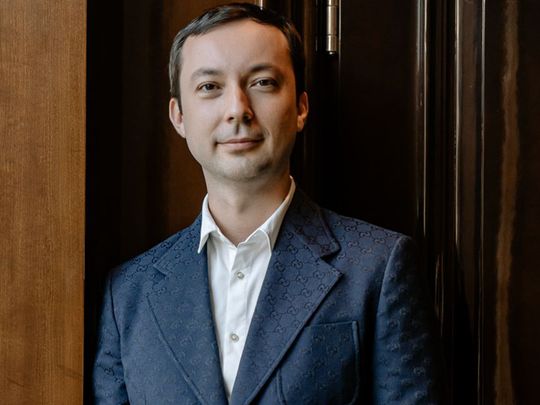
When Russia-born 37-year-old Dmitrii Basalkin started a mobile app six years ago in Hong Kong, he hoped to get non-English speakers to learn the basic level of the language by using the tool. Now, the UAE resident’s app is used by millions to learn all levels of Spanish, French, Japanese and Arabic.
“I had devoted myself to language learning because it is a major endeavour, and it’s a challenge I am now capable of solving for others. I also believe language learning is an excellent field for applying Artificial Intelligence (AI) and deploying improvements,” he said, when asked why he chose the field.
Basalkin, who has been dividing his time between his new home in Dubai and his business in Abu Dhabi since 2021, prides himself in not only getting 30,000 paid clients in the first year of launching Bright AI in 2017, but also in being able to turn the business profitable the same year.
750,000 paid customers, 25 million users
With currently 750,000 paid customers and 25 million users worldwide, Basalkin revealed that the multilingual learning application made over Dh30 million in revenue during 2022 alone, but he attributed this success to the fact that this wasn’t his first experience with entrepreneurship.
“Our early success was made possible by combining my co-founders' and my previous experience with various educational start-ups from 2011 to 2017. In 2011, I got into the business of language learning and joined a start-up, where I ran monetisation and user acquisition,” he added.
“From 2011 to 2014, the start-up’s user base grew from 100,000 to 5 million and I helped develop web and mobile apps. Since I left the company in 2014, language learning stayed a constant interest of mine, and so, two years later, motivated to take a shot, I founded my own business in 2017.”
“I learnt the importance of business processes, how to build and adjust them to changes. Plus, this encouraged me to become an entrepreneur. So, I am lucky: my first real job was running my own business in 2010; it was a platform for advertising in online games.”
Funding language learning app from scratch
“These experiences as an entrepreneur contributed significantly to the development of my business skills. It was a revelation that a belief in a business idea and self-confidence can open a lot of doors, and that people can be very open to those who have a purpose in life and are able to convey it.”
For the language learning app, initial product development in 2017 cost Dh200,000, which Basalkin said was funded with his savings. The business registration cost Dh30,000, and initial marketing cost Dh100,000, he detailed, while adding the first profits were reinvested in the app to add more clients.
“We then had to analyse countries where it might make sense to establish a headquarters for developing the business further and deploying AI into the app. We chose the UAE to settle down because of the government’s focus on technology,” he added. “We want to contribute to it.”
I had devoted myself to language learning because it is a major endeavour, and it’s a challenge I am now capable of solving for others
How did becoming an entrepreneur change you?
Basalkin admitted that becoming an entrepreneur primarily involved changing his working style, while also teaching him the hard lesson of finding a balance with being a boss and finding time for non-work activities and his family life.
“As I learn to get better results with less effort, my focus has been shifting from 'working harder' to 'working smarter'. I am still mastering the art of setting priorities and saying ‘no’. Learning to turn down tasks, ideas, and projects helps maintain focus on the goal and save resources,” he said.
Being disciplined and learning to put everyday tasks to bed is a constant lesson for Basalkin, he shared. “Delegating has become a crucial skill, and I now spend less than 20 per cent of my time on operational management, allowing me to focus on key strategic aspects of the business.
“Although a 40-50 hour workweek is my norm, it's reduced from 5 years ago when the app started. Now, I add physical activities like gym or boxing as part of my working hours. With the flexibility my business offers, I can work remotely part of the time and explore new countries with my wife.”
“Entrepreneurial journey is always about ups and downs, and it’s never a straight line from A to B. Nevertheless, an lesson I learnt for myself and can be used by my peer entrepreneurs is to keep eyes fixed on increasing income from clients and to start with sales as soon as possible,” he added.
“Many people are dazzled by aesthetics, which are, in fact, secondary to their revenue stream but very demanding in terms of resources. They invest their time and money in unnecessary things that don’t bring them any closer to making sales, and eventual decline becomes just a matter of time.”
Any strategies when it comes to personal savings?
1. Learn to earn first, save second, invest third
Basalkin said he is “deeply convinced” that learning how to earn money comes before understanding how to save, and only after that does it become important to consider how to spend and invest. This is a key money motto he lives by. “I believe people often undertake these steps in the wrong order.
“What's the use of investing if one hasn’t mastered earning and saving and has no initial capital therefore? Revenue always comes first; that’s a lesson I've learned well. My initial goal was to accumulate capital through the profits and dividends from my business,” he explained.
“Once that was achieved, the third part of the financial formula – spending – became much more important. I prefer to keep daily expenses under control and reinvest in my own business or in UAE properties. Most of my personal investments are in property, where I see high potential for growth.”
2. Save for specific goals, control impulsive spends
Basalkin went on to detail how he grew up in a family with an average income. “My parents taught me to save for key goals and how to control impulsive urges by staying focused. Thanks to these lessons, I launched the app without external funding. This still benefits my business as it grows.
“My father opened one of the first computer stores in our city in the early 1990s, which gave me access to computer technology much earlier than to my peers. So I spent loads of time with computers and there was no option for me to start a business other than in the tech field,” he said.
“Every opportunity is time limited. Immediate opportunities demand swift and assertive action, but they can leave you with zero outcomes. So in this game of low probabilities and high rewards, evaluate potential outcomes and go after opportunities that promise 10 times the outcome.
“On the other hand, long-term opportunities require more strategic decision-making and investments to secure future profits, but the progress is steady and gives more linear results. Financial discipline is crucial in both short and long terms. Even with increasing sales and net profit, it's important not to lose control over expenses, salaries, and investments in new, unverified opportunities.”








